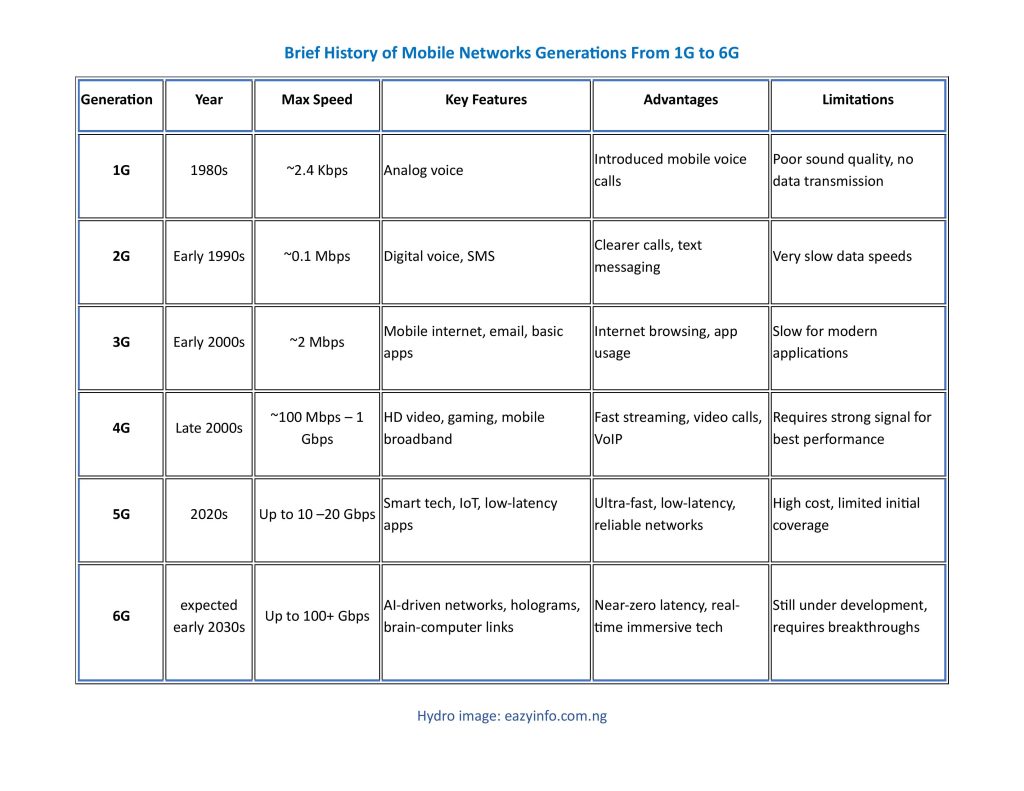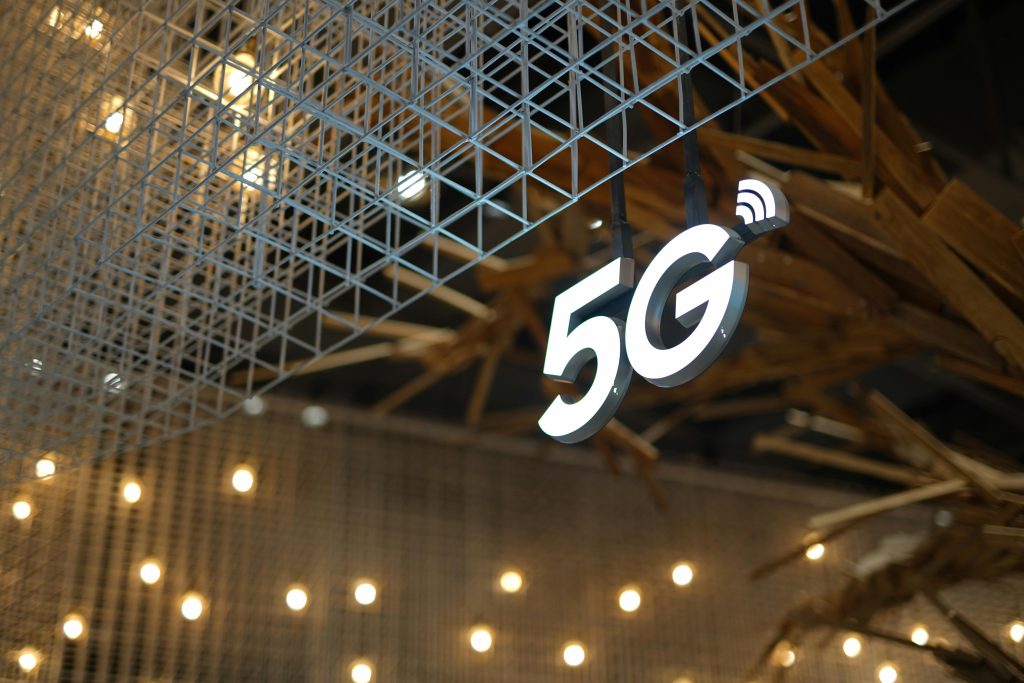Introduction:
As the world continue to step into a more connected and digitally driven future, 5G technology stands at the forefront of this transformation. For Nigeria, this next-generation network presents a massive and promising opportunities, not just for faster internet, but for a complete overhaul of how industries and formal sectors operate, how people interact with technology, and how the digital economy will find a contusive environment for easy integrate and growth.
Unlike the previous generations, the potentials of 5G mobile networks will unlock and Fasttrack innovation, improve productivity, create new economic pathways and become a key driver for national development in the years to come.
What exactly is 5G?
5G, short for Fifth-Generation Mobile Network, is the latest advancement in wireless communication technology in use. It is designed to deliver faster data network speed, lower latency, seamless connectivity, and more reliable internet performance than the previous generations.
Unlike its predecessors, 5G can handle larger numbers of devices simultaneously, making it ideal for our world that constantly relied on smart technologies, such as self-driving cars to remote surgeries, IoT, live streaming, and fully connected cities.
5G, or fifth-generation mobile network, is a revolutionary step in the wireless communication ecosystem. It delivers ultra-fast speeds, very low latency, and increased capacity, enabling advanced technologies such as smart cities, autonomous vehicles, remote healthcare, and the Internet of Things (IoT). More than just better mobile data, 5G creates a digital ecosystem for innovation.
A Brief History: 1st Mobile Network Generation (1G) to 6th Generation (6G)
Mobile networks have come a long way since their inception in the early 1980s. 1G, also known as the first generation of mobile telecommunications standards, was said to have been launched in Japan by Nippon Telegraph in 1979.
Each generation unarguably brought its peculiar transformative changes to communication at the time, laying the foundation for today’s connected world and beyond.
Brief History of Mobile Networks Generations From 1G to 6G
| Generation | Year | Max Speed | Key Features | Advantages | Limitations |
| 1G | 1980s | ~2.4 Kbps | Analog voice | Introduced mobile voice calls | Poor sound quality, no data transmission |
| 2G | Early 1990s | ~0.1 Mbps | Digital voice, SMS | Clearer calls, text messaging | Very slow data speeds |
| 3G | Early 2000s | ~2 Mbps | Mobile internet, email, basic apps | Internet browsing, app usage | Slow for modern applications |
| 4G | Late 2000s | ~100 Mbps – 1 Gbps | HD video, gaming, mobile broadband | Fast streaming, video calls, VoIP | Requires strong signal for best performance |
| 5G | 2020s | Up to 10 –20 Gbps | Smart tech, IoT, low-latency apps | Ultra-fast, low-latency, reliable networks | High cost, limited initial coverage |
| 6G | expected early 2030s | Up to 100+ Gbps | AI-driven networks, holograms, brain-computer links | Near-zero latency, real-time immersive tech | Still under development, requires breakthroughs |

Comparing 5G with Previous Generations
5G mobile technology surely beats the performance of previous generations in terms of Speed and capacity (download / upload), latency, reliability, etc.
- Speed: 5G can be up to 100 times faster than 4G, enabling instant downloads, seamless streaming, and real-time interactions.
- Latency: 5G reduces latency to as low as 1 millisecond, which is crucial for applications like autonomous vehicles and remote surgeries.
- Capacity: 5G supports a massive number of devices per square kilometer, making it essential for smart cities and IoT ecosystems.
- Energy Efficiency: 5G networks are more energy-efficient, improving battery life for connected devices.
Advantages of 5G:
- Incredible-fast download and upload speeds
- Ultra-low latency
- Greater capacity and reliability
- Drives innovation across multiple sectors (health, agriculture, manufacturing, finance, communication)
Disadvantages:
- High cost of infrastructure deployment
- Limited initial coverage, especially in rural areas
- Compatibility issues with older devices
- Requires skilled workforce and advanced cybersecurity
Global Impact and Nigeria’s Opportunity with 5G technology
5G technology has the power to reshape Nigeria’s economic landscape in numerous ways. According to NCC Nigeria, ‘5G is the newest generation of technology, which will bring about transformation in the country in the areas of smart city, smart transportation, efficiency in medicine, streaming entertainment, and a lot of automation, 5G will control a lot of appliances and devices with respect to Internet of Things (IoT)’.
It will boost Nigeria’s GDP and improves its socio-economic standards within few years of existence. https://ncc.gov.ng/media-centre/press-releases/5gll-offer-great-potential-nigerias-socio-economic-development#:~:text=Wakil%20explained%20that%205G%20is,of%20Things%20(IoT).%E2%80%9D
A report by PricewaterhouseCoopers (PwC) estimates that 5G will have a trillion-dollar impact across five key industries by 2030. While North America is expected to see the largest GDP uplift from 5G, followed by Asia, Oceania, and then Europe, the Middle East, and Africa (EMEA), Nigeria and other emerging markets have a unique opportunity to leapfrog traditional barriers and fast-track digital transformation.
According to Business Insider Intelligence, 5G is projected to contribute more than $2.2 trillion to the global economy over the next 15 years. More than just higher speeds, 5G brings along a host of technical upgrades that can supercharge the adoption of emerging technologies like Artificial Intelligence (AI) and the Internet of Things (IoT) and also autonomous systems as well as smart cities while also enhancing the performance of existing infrastructure.
Emerging markets like Nigeria are well-positioned to take advantage of this technological shift. With the right policies, investments, and public-private partnerships, Nigeria could become one of the first developing countries with widespread 5G access to boost connectivity, encouraging innovation and fostering new digital businesses. If supported with the right policies and partnerships, 5G will accelerate digital transformation and become a critical enabler for AI, robotics, fintech, agriculture, and other sectors of the economy.
6G and Its Potentials
6G is the anticipated sixth generation of wireless technology which is projected to commercially launch around 2030. While 5G is about connecting everything faster and more efficiently, 6G will aim to make 6G networks intelligent, autonomous, and deeply immersive.
Key potentials of 6G include:
- Speeds 50–100x faster than 5G, for example; enabling real-time holographic communication.
- Latency under 0.1 milliseconds, crucial for next-level applications like brain-computer interfaces.
- AI-native networks that manage themselves, predict demand, and adapt in real time.
- Global coverage, possibly through low-orbit satellites for underserved regions.
6G will have the capability to power everything from immersive metaverse experiences to remote surgery with tactile feedback, AI-powered robotics, and smart environments that automatically respond to human presence.
Conclusion
The evolution of mobile network technologies since the begining of 1980s to date (from 1G to 5G), tells a powerful story and innovative spirit of mankind. Not just because of how faster 5th generation networks can be, but because of such desire for deeper societal transformation. Each generation has of course brought the world closer together, expanding what is possible in the world of communication, commerce, healthcare, fintech and education.
- 1G gave us the magic of mobile voice: This is the first generation of mobile networks which was introduced in the 1980s. It marked the beginning of wireless communication to the world. 1G enabled people to make voice calls on the go using analog technology. Even though you get limited and poor sound quality, with some security issues, it definitely laid the great foundation for our mobile communication today.
- 2G added digital clarity and messaging capabilities: It was launched in the early 1990s to replace the analog signals of 1G with digital signals. It provides clearer voice calls and also improved some security concerns associated with 1G.
The greater transformative feature of 2G, was the introduction of SMS (Short Message Service) that allowed users to send and receive text messages over the network. - 3G brought the mobile internet to life: The rollout of 3G in the early 2000s changed the dynamics of mobile communications, for example; mobile phones began to evolve into internet-enabled devices, allowing users to browse the web, create and check emails, media streaming came into play. 3G networks opened the door to mobile apps, video calling, and more connected lifestyles thereby setting the stage for smartphones and other devices.
- 4G delivered to us the app economy: Since its public emergence around the year 2009, 4G networks especially the Long Term Evolution (LTE) took speed and connectivity to newer heights we have never seen before, it gave us access to mobile videos with minimal buffering. It came with faster data transfer rates, enabled seamless streaming of high-definition videos through both desktop and mobile Applications, real-time gaming, and made easy for cloud-based services to operate. https://www.verizon.com/about/our-company/5g/what-5g
We also witnessed the rise of platforms like Uber technologies providing online ride services, Instagram and TikTok and many others. All these and many more owes much to the speed and stability of 4G networks. But Nigeria didn’t get to enjoy all these benefits until around 2016 when 4G network was introduced to the Nigerian telecommunication market. - 5G enables smart and real-time systems to function smoothly: This generation of network is currently on deployment around the world. 5G offers incredibly fast network speeds, ultra-low latency, and massive device connectivity. It is powering real-time applications such as autonomous vehicles, remote clinical surgeries, smart factories, and expanding Internet of Things (IoT) ecosystems. It is not only about its incredible speed but being the backbone for the next wave of digital innovation and very important building blocks for the incoming 6G wireless networks expected around 2030s.
- 6G will enable experiences that are genuinely intelligent, immersive, and autonomous:
The 6th Generation network for commercial use is expected to come around before 2030, though it is still in the research phase but it holds immense promise to further revolutionize our technological ecosystem.
The transition from 5G to 6G aims to go beyond just connectivity but embedding artificial intelligence directly into the network infrastructures. With speeds potentially 100 times (1,000 Gbps – 1 Tbps download speeds) faster than 5G (upto 20Gbps) and latency reduced to near-zero, 6G could make science fiction a reality by enabling real-time holograms, brain-computer interfaces, making streaming entertainments appear magical and fully immersive virtual and augmented reality experiences. More detail comparison between the 5th and the incoming 6th generation of mobile networks can be found in 6gworld blog below:
For Nigeria, this journey represents not just a technological shift but a national opportunity to massively grow the digital economy. From 1st to 5th generations of wireless technology, each generation brought about significant and relevant evolutionary progress at each stage.
Without mincing words, 6G sounds almost like a science fiction movie, but it is coming even faster than we anticipated. Talk about the mind-blowing speed level it we attend looking ahead, ability for instant communication, and making easy the adoption of things like holograms, fully immersive virtual worlds, and also providing platforms for our brains to connect directly with smart devices. It is the future we have seen in the movies and have been waiting for, it is slowly becoming real guys! Even though the deployment of 5G in Nigeria has been a snail walk yet, Nigeria must begin early planning for 6G technology now by investing in infrastructure, digital literacy, research, and innovation, Nigeria can easily move from a consumer of emerging technologies to a leader in next-generation connectivity.
written by Eugene N.I.



